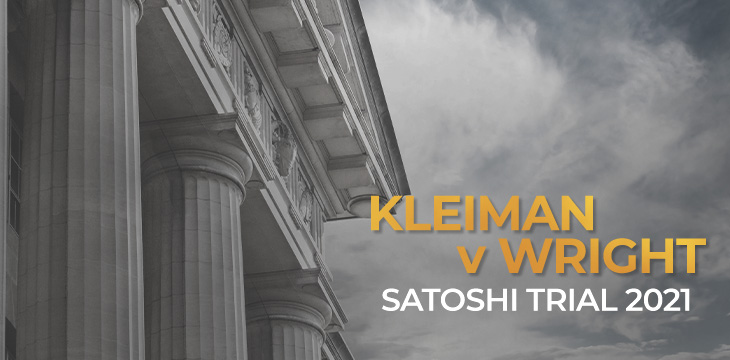|
Getting your Trinity Audio player ready...
|
The jury are officially out for deliberations in the trial of the century. They’ve spent weeks listening to lawyers argue over whether Dr. Craig Wright invented Bitcoin alone or whether he did it with the late Dave Kleiman.
It’s a relatively complex case, with billions’ (if not tens of billions) worth of digital assets and intellectual property at stake.
Though the case is largely about that one key question—the specific authorship of the Satoshi Nakamoto project—the jury is being asked to decide on 25 questions in total (they are available here).
These include the seven formal counts on which the jury must return a verdict of either guilty or not guilty. Because the suit is being brought on behalf of two plaintiffs—the W&K company and the estate of David Kleiman—there are some counts which the jury must specify which of the plaintiffs the defendant is liable to.
The seven counts are:
- Breach of partnership: was there a partnership between Dave Kleiman and Dr. Craig Wright, and if so, did Dr. Wright breach that partnership?
- Conversion: did Dr. Wright wrongfully exercise control over the property of Dave Kleiman and W&K?
- Civil theft: did Dr. Wright obtain (or attempt to obtain) the property of Dave Kleiman, W&K and/or the partnership, with criminal intent to derive that party of the property?
- Fraud: did Dr. Wright make false statements or (or make omissions) which he knew to be false, with the intention that Dave Kleiman or W&K rely on that statement (or omission), and did such reliance cause damage to either Dave Kleiman or W&K?
- Constructive fraud: did Dr. Wright take advantage of a relationship of trust between himself and the plaintiffs, thereby causing that plaintiff damages?
- Breach of fiduciary duty: did Dr. Wright fraudulently obtain a judgment against W&K in Australia, thereby breaching a fiduciary duty owed by Dr. Wright to the company?
- Unjust enrichment: did Dr. Wright receive a benefit from Dave Kleiman and/or W&K, and would it be inequitable for Dr. Wright to retain that benefit without paying for it?
Further, for each of the counts which are returned guilty, the jury must also tell the Court the amount of damages caused by the defendant’s conduct. These are specific compensatory damages and are solely concerned with making the plaintiff(s) whole again.
The case is about the alleged theft of both Bitcoin and intellectual property; to the extent the jury find Dr. Wright guilty on any of the seven counts, they have been directed to value any of the partnership’s Bitcoin or intellectual property at present-day prices.
Further, because no exact terms of the alleged partnership between Dr. Wright and Dave Kleiman have been put forward by the plaintiffs, in the absence of any other information the law assumes that the assets of the partnership are to be divided equally.
What this means for the Bitcoin at issue in the case, for example, is that the jury must first determine the number of coins owned by the partnership. Then, they must specify the dollar value of the coins at present-day value. The final amount of compensatory damages will be half that number.
The jury also needs to decide which portion of the Bitcoin awarded goes to Dave Kleiman’s estate and which portion goes to W&K.
The jury must rule on the two affirmative defenses being put forward by Dr. Wright. Because affirmative defenses typically consist of a defendant arguing that they are not legally liable even if the allegations in the lawsuit are true, these can only be considered once the jury has decided on the seven principal counts.
The two affirmative defenses are statute of limitations and laches. The defense had originally argued for 14 individual affirmative defenses—all but these two were struck out by the court before trial.
The statute of limitations defense is simply an argument that the defendant is free from liability due to the statutory period for liability has passed. This is only being asserted in relation to the conversion, unjust enrichment, fraud, constructive fraud, and breach of fiduciary duty claims.
The laches defense is an argument that the plaintiff took an unreasonable amount of time in bringing their claim.
The final question the jury must decide is a big one: whether to award the plaintiffs any punitive damages. These sit over and above the specific compensatory damages associated with each count and exist solely to punish the defendant for particular conduct.
To award punitive damages, the jury must be satisfied that the defendant was guilty of intentional misconduct or gross negligence. This means that for punitive damages to be awarded over and above the level of compensation required, the defendant must be proven to either have had had actual knowledge of the wrongfulness of the conduct or been so reckless as to the wrongfulness of his behavior that it amounted to a conscious disregard for the rights of the plaintiff(s).
As such, punitive damages are only suitable for three of the counts: conversion, fraud and constructive fraud. The specific amount is discretionary on the part of the jury.
These are the questions that the jury are now confronted with. Foreseeably, the jury could return a verdict as soon as this afternoon. However, if the jury have to pick through the hours upon hours of testimony and document examination they’ve seen over the last few weeks to try and determine the exact amount of Bitcoin owing to the Satoshi Nakamoto partnership, it seems likely that deliberations continue up until Thanksgiving Day on Thursday—and potentially beyond.
Check out all of the CoinGeek special reports on the Kleiman v Wright YouTube playlist.

 02-26-2026
02-26-2026 




